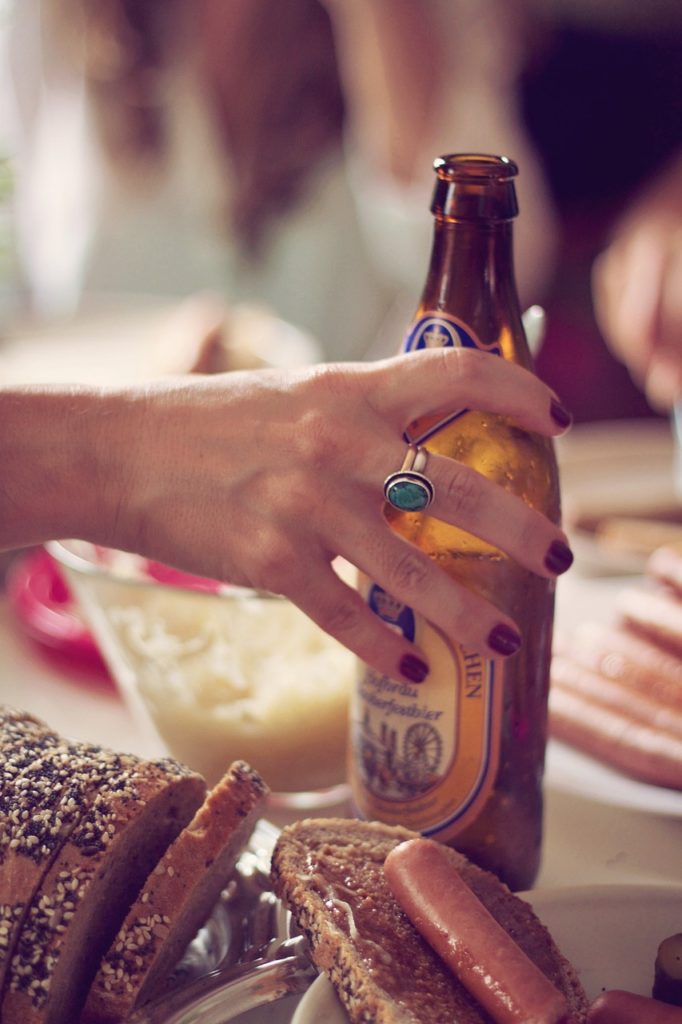- Calls to this hotline are currently being directed to Within Health, Fay or Eating Disorder Solutions
- Representatives are standing by 24/7 to help answer your questions
- All calls are confidential and HIPAA compliant
- There is no obligation or cost to call
- Eating Disorder Hope does not receive any commissions or fees dependent upon which provider you select
- Additional treatment providers are located on our directory or samhsa.gov
Drunkorexia: Eating Disorder or Addiction?

Contributor: Crystal Karges, MS, RDN, IBCLC, Director of Content and Social Media at Eating Disorder Hope/Addiction Hope
Circulating the media lately and becoming widespread around college campuses and universities, the term “drunkorexia” has been used more commonly.
Used to describe the combined behaviors of restricting caloric intake in order to binge drink, drunkorexia has become an alarming trend, particularly among college students.
While drunkorexia is not a diagnosable disorder, this term is characterized by certain behaviors that might include restrictive eating as a means of compensating for binge drinking.
The Combination of Dangerous Behaviors
Behaviors associated with drunkorexia may vary based on the individual. Some people may purposely avoid eating anything prior to a night of drinking in order to increase the effects experienced from alcohol ingestion. Others may restrict eating as a way to “make-up” for the calories that come with heavy drinking, skipping meals a day or two entirely before drinking, extended fasting periods, and more.
What may be a common behavior and even something that is “socially” acceptable, the behaviors associated with drunkorexia does not come without dangerous risks and consequences.
The pattern of restricting nutrient intake through food and then flooding the body with a large quantity of alcohol can lead to detrimental health consequences, such as memory lapses and blackouts, liver cirrhosis, dehydration, nutrition deficiencies, cognitive disturbances, hypoglycemia and more. Psychological consequences might include increased risk of depression, anxiety, and other mental health issues.
Eating Disorder or Addiction?
 Drunkorexia is classified as neither an eating disorder nor an addiction, so it can be tricky to understand when to get help or how to receive adequate treatment. Individuals who regularly engage in behaviors associated with drunkorexia may also have an eating disorder, be more susceptible to substance abuse, or have a combination of both issues.
Drunkorexia is classified as neither an eating disorder nor an addiction, so it can be tricky to understand when to get help or how to receive adequate treatment. Individuals who regularly engage in behaviors associated with drunkorexia may also have an eating disorder, be more susceptible to substance abuse, or have a combination of both issues.
Even though there is not set criteria to define what drunkorexia actually is does not mean this issue should be less of a concern. Because of the dangerous consequences that can result from the combination of binge drinking and restrictive eating, professional help should be sought for appropriate interventions.
If you or someone you care for has struggled with drunkorexia, do not ignore these dangerous behaviors. Seeking out the support of a mental health professional can be helpful in beginning an effective path towards treatment and to prevent worsening problems from developing.
Community Discussion – Share Your Thoughts Here!
What are some misconceptions associated with drunkorexia?
 About the Author: Crystal is a Masters-level Registered Dietitian Nutritionist (RDN) with a specialty focus in eating disorders, maternal/child health and wellness, and intuitive eating. Combining clinical experience with a love of social media and writing, Crystal serves as the Special Projects Coordinator for Eating Disorder Hope/Addiction Hope, where her passion to help others find recovery and healing is integrated into each part of her work.
About the Author: Crystal is a Masters-level Registered Dietitian Nutritionist (RDN) with a specialty focus in eating disorders, maternal/child health and wellness, and intuitive eating. Combining clinical experience with a love of social media and writing, Crystal serves as the Special Projects Coordinator for Eating Disorder Hope/Addiction Hope, where her passion to help others find recovery and healing is integrated into each part of her work.
As a Certified Intuitive Eating Counselor, Crystal has dedicated her career to helping others establish a healthy relationship with food and body through her work with EDH/AH and nutrition private practice.
The opinions and views of our guest contributors are shared to provide a broad perspective of eating disorders. These are not necessarily the views of Eating Disorder Hope, but an effort to offer discussion of various issues by different concerned individuals.
We at Eating Disorder Hope understand that eating disorders result from a combination of environmental and genetic factors. If you or a loved one are suffering from an eating disorder, please know that there is hope for you, and seek immediate professional help.
Last Updated & Reviewed By: Jacquelyn Ekern, MS, LPC on August 14, 2016
Published on EatingDisorderHope.com

The EatingDisorderHope.com editorial team comprises experienced writers, editors, and medical reviewers specializing in eating disorders, treatment, and mental and behavioral health.

